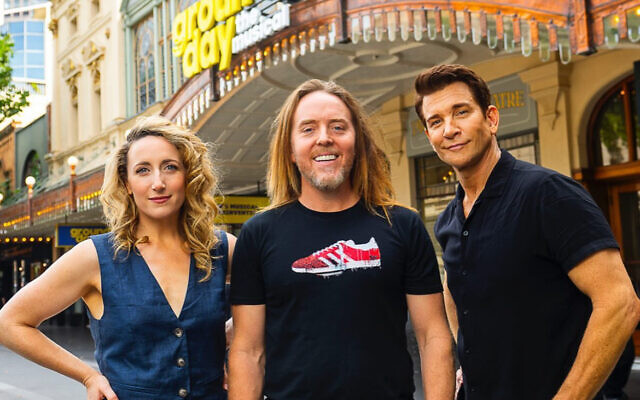Groundhog Day shines as a musical
Jewish writer Danny Rubin discusses the “empowering message” of his hit comedy with Sharyn Kolieb.
The famous 1990s movie Groundhog Day that starred Bill Murray as weatherman Phil Connors who became trapped in the same day over and over, has been made into a musical thanks to the creative brilliance of Australian composer, actor and comedian Tim Minchin, alongside the original writer of the screenplay Jewish American Danny Rubin, and English theatre director Matthew Warchus.
Many may wonder whether turning this cult film into a musical actually works. Well having attended its opening at Melbourne’s Princess Theatre on February 1, I can tell you it is outstanding.
Groundhog Day the musical has played at the West End, and on Broadway receiv- ing critical acclaim, and now Australia is the third place to host it. It is playing exclusively in Melbourne in the hope that people will flock from around the country to see it.
The lead role of Phil Connors is played by Olivier Award-winning and Tony Award-nominated star Andy Karl, who also played Phil in London and New York, and successfully manages to distinguish himself from Bill Murray to make this role his own. Joining Karl on stage in this romantic comedy is Elise McCann as the kind-hearted television producer Rita Hanson.
This musical is for mature audiences given its at times crude language and dark humour, but it is also those elements that remove the cheesiness often associated with many musicals, to make it fresh and insightful into the deeper meanings of life.
Before it was even a musical, the film had become more than just a ’90s classic comedy, with its lessons about the human condition studied by Buddhists, rabbis and priests.
The AJN asked its Jewish writer Danny Rubin why he believed its message was timeless. He said, “I think at its heart the story is our story – we don’t know how we got here anymore than Phil Connors knows how he got into his situation, and, now that we are here we don’t know what we’re supposed to do, either. The idea that it tells the tale of a man who is stuck and unable to escape has further resonance since it gives a name to something that we all experience from time to time. Finally, I think the story is ultimately extremely optimistic and hopeful. The worst day of Phil’s life is exactly the same day as the best day, and the only difference is Phil himself. I think that is an empowering message.” He adds, “I think it’s also fair to mention that both the film and the musical are remarkably entertaining!”
Rubin worked with legendary Jewish American director and actor Harold Ramis, famous for works including Ghostbusters, to make the Groundhog Day movie. Ramis once commented to the media that Groundhog Day is like Torah in that, “The Torah doesn’t change, but every year we read it we are different. Our lives have changed … and you find new mean- ing in it as we change.” On this Rubin said, “I very much agree with Harold’s quote about the Torah, or what we might call putting our feet into the same river twice. It’s never the same river, and we are not the same people. Many have written to me about how the movie affected them at particular times in their lives, and I myself have certainly discovered different aspects of the story as my own life marches along.”
Regarding working with Ramis, Rubin said he “felt really honoured to work with Harold”, noting, “He was not just a film comedy icon but, famously, a nice person, a thoughtful person, and really smart.” He said, “I loved our early conversations about the themes of my story not particularly the Jewish themes so much as the Buddhist ones such as reincarnation and some philosophical ones, including what he called the Superman problem (how could Phil not save everybody every single day if he had that power?) Harold jokingly referred to both me and himself as ‘Buddhish’.”
As to whether working on a musical about Groundhog Day felt like Groundhog Day, Rubin replied, “Not at all. It was really a privilege to get to re-examine the material 20 years later. The story has so many facets that I knew, even when I wrote the original screenplay, that I was only able to choose from among them and explore what I could from there. I was never attracted to the idea of writing a sequel, but getting the opportunity to revisit the same story at a differ- ent time in a different medium was endlessly exciting for me.”
Rubin said he has loved working with Minchin on this musical.
He reflected, “I remember back in graduate school I imagined that my perfect future job would be to work in collaboration with other people who were really good at what they did in whatever medium. This particular collaboration with Tim and with the brilliant Matthew Warchus was the absolute best realisation on that dream.”
The collaboration has been a great success as Groundhog Day the musical retains the depth and humour of the film, while Minchin and Warchus have refreshed its message with captivating creativity and musical genius.
Groundhog Day is at the Princess Theatre in Melbourne until April 7. Tickets are available at: groundhogday.com.au


comments